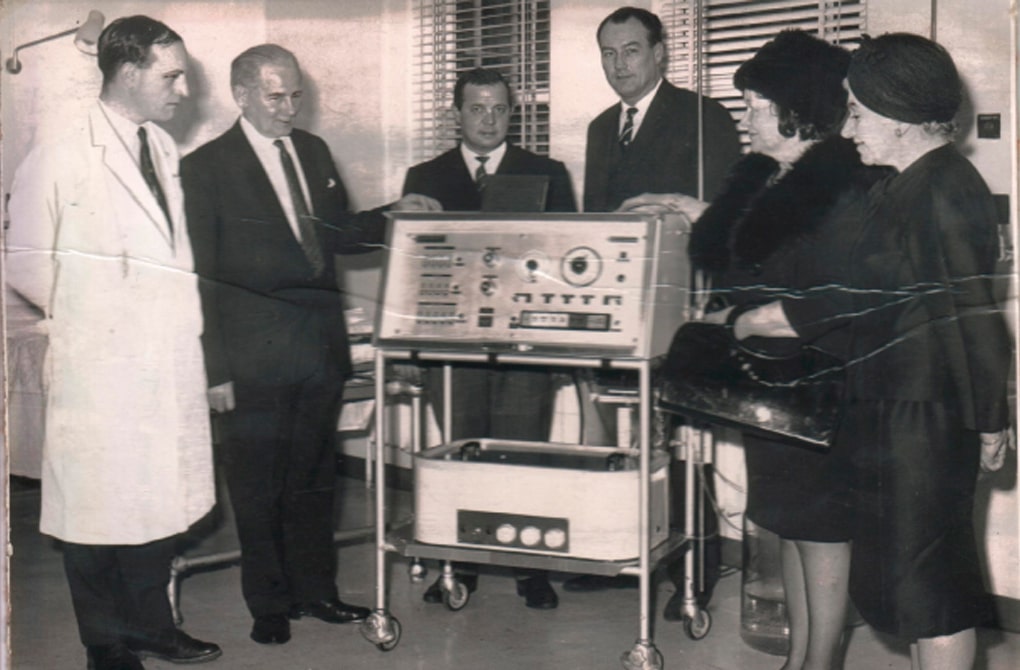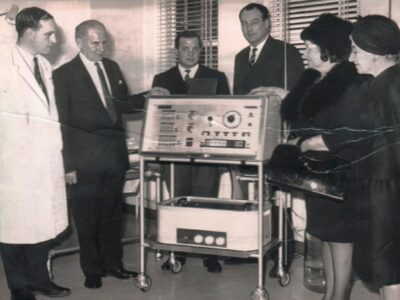History of Kidney Wales
The History of Kidney Wales dates back over 50 years
In 1967, the only renal unit in Wales, at the Cardiff Royal Infirmary, had limited resources to treat patients with total kidney failure. There were very few dialysis machines, and the only patients who received dialysis were those with acute renal failure, that is, patients whose kidneys might not be expected to recover.
A group of three local businessmen approached Professor Harold Scarborough, the Professor of Medicine at the CRI, and offered to buy a kidney machine for the hospital. However, the Welsh Hospital Board had already started planning for a dialysis unit for the CRI, and Prof Scarborough persuaded the men that a better option would be to support research to try to find better treatments and cures for kidney diseases.
They raised enough money to equip a laboratory in the dialysis unit. Delighted by their success, the men formed the Kidney Research Unit for Wales Foundation (KRUF) in 1967. KRUF captured the public imagination, and soon there was a thriving network of local committees raising funds.
In 1972, the University Hospital of Wales was opened at the Heath, Cardiff, and the Academic Medical Unit (AMU) transferred there, leaving the renal unit at the CRI. KRUF turned the old AMU into the KRUF Institute of Renal Disease, with laboratories, offices and a small lecture room.
The Institute was headed by Professor (now Sir) William Asscher and it soon established itself as one of the leading renal research units in the world. When the CRI closed in 1999, the Institute moved to the University Hospital to become the Institute of Nephrology.
In its history, the charity has supported many other aspects of kidney patient care, including transplantation, which originally started in Wales at Llandough Hospital in 1967. Soon after it was transferred to a small, enclosed space at the CRI, but that was far from ideal. When the dermatology department moved to the University Hospital, vacating its isolation ward, KRUF stepped in and funded its conversion into a purpose-built, nine-bed transplant unit.
Elsewhere, it had begun supporting the annual South and West Wales kidney patients’ meetings, which subsequently evolved into the Welsh Kidney Patients’ Association.
In addition, KRUF played a major role in getting an organ donor card attached to new driving licences, and was instrumental in setting up Lifeline Wales, a database of people willing to be organ donors in the event of their death. This pioneering scheme was launched in 1986 by the late Princess of Wales and was part-funded by the charity.
For many years there were only two dialysis units in Wales – at Cardiff and at Rhyl – but these could not cope with the demand.
A visit to Germany to study their arrangements produced the idea of the NHS contracting out dialysis units to non-profit making organisations. The idea was presented to the Welsh Office, and arrangements were made to invite tenders for the provision of dialysis units.
Commercial organisations secured the contracts and by 1985 there was a marked expansion in dialysis facilities, with new units created in Swansea, Bangor, Merthyr and Wrexham.
During its long and distinguished history, KRUF has also contributed towards the staff costs of caring for renal patients, including most recently a children’s psychologist in Cardiff.
Not long into the 2000’s and Kidney Wales began a long, but successful campaign, regarding Organ Donation Law in Wales. Following numerous consultations, research and polling, it became clear that the UK needed to become more progressive around its approach to organ donation, and a new culture needed to be created, that would help support those on the transplant list. On December 1st 2015 Wales became the first country in the United Kingdom to introduce an “opt out” system for organ donation, which aimed to increase the number of organs available for transplant. Kidney Wales is pleased to have played a pivotal role in this change for Wales, leading the way for other UK nations to then follow.
It can be seen that Kidney Wales has a proud record of support for kidney patients in Wales. The current Trustees and Staff are determined to build on this remarkable achievement.

